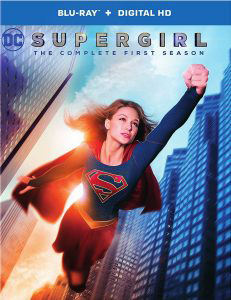“Supergirl” (8 p.m. Eastern Mondays on CBS) is a slickly produced and nicely acted but utterly unnecessary and unimaginative addition to TV’s comic-book superhero boom. Because it’s in the same timeslot as another DC adaptation, “Gotham,” and the year’s best new show, “Crazy Ex-Girlfriend,” my DVR wouldn’t record it and I watched it on the Internet. It was hardly worth the extra effort.
Origin plays in shadow of Superman
The origin story of Kara Zor-El/Supergirl (Melissa Benoist, following in the footsteps of film actor Helen Slater – who now plays Supergirl’s adoptive mom — and “Smallville’s” Laura Vandervoort) plays in the shadow of Superman’s.
He has already been celebrated in Metropolis, where the Daily Planet puts him on their cover 54 percent of the time, making it an unusually successful newspaper in (what apparently is) 2015. Meanwhile, the National City newspaper – owned by media magnate Cat Grant (Callista Flockhart) is laying off people because it doesn’t have a superhero to put on the cover. Kara’s job as an assistant is among the positions in peril.

“Supergirl” Season 1 (2015)
Mondays, CBS
Creators: Ali Adler, Greg Berlanti, Andrew Kreisberg
Stars: Melissa Benoist, Chyler Leigh, David Harewood
When she sees on the news that her sister Alex’s (Chyler Leigh) plane is about to crash, Kara decides to stop trying to blend in, catches the plane and guides it to a safe water landing. By episode’s end, five people know of Kara’s true identity – her parents, Alex, and coworkers Winn (Jeremy Jordan) and James Olsen (Mehcad Brooks).
Benoist is easy to like in the lead role, portraying enthusiasm and excitement at the idea of embracing her destiny, albeit in an unsurprising way. Everyone else falls into basic helper roles. Winn has a crush on Kara but then immediately segues into being her outfit designer when he learns her identity. Alex works for a U.S. government group that guards against alien invasion. Olsen took the photography job in National City at the prodding of his pal Supes, who wanted him to be a friend and mentor to Kara as she learned how to be a superhero.
Comic book fans can explain better than me how closely the pilot episode adheres to the traditional lore, but from the perspective of recent TV, “Supergirl” feels a lot like “Marvel’s Agents of S.H.I.E.L.D.,” which I dropped from my viewing schedule last season. I don’t care about the heroes or villains, which in this case are evil aliens from Krypton who want to kill Kara – and all humanity, apparently – for the perceived wrongs of previous Zor-El generations.
She’s not fighting 2015 evils
Maybe upcoming episodes will prove me wrong (in a closing voiceover, Supergirl resolves to help all of humanity however she can), but the show seems uninterested in having Supergirl fight real-world 2015 evils, or close parallels, instead favoring the alien baddies.

There are no layers to be found in the pilot episode. As noted, Kara is thrilled that she finally decides to just be a superhero at age 24. She feels no guilt over the years when she selfishly opted to act normal when she could’ve saved countless lives (although she does kind of throw some blame at Alex for advising her to blend in), nor does she reflect on the fact that she saved the plane for a selfish reason — because her sister happened to be on it.
The climactic fight scene doesn’t make sense. Supergirl and the Krypton villain, Vartox, are both people-of-steel, so Vartox should theoretically win since he is a professional henchman and she has not trained in even the most basic fighting skills. Still, she has eye beams that he apparently lacks, so she gets an edge after blowing up his alien ax. He doesn’t die from the explosion, but for some bizarre reason opts to stab himself with the ax blade rather than continuing the fight.
If this is due to the idea that Supergirl – like her cousin – doesn’t kill people, then this series could become headache-inducing for writers trying to find ways for supervillains to die without the hero killing them.
“Supergirl” painfully grasps at the notion that a female superhero is a groundbreaking concept, a 1970s-ish idea that clashes with what otherwise appears to be a modern setting. At one point, a waitress watching the TV news expresses a thrill that her daughter now has a female role model to look up to, as if “being a role model” is an alien superpower along with flight and invulnerability.
Superman like an absent center
For those interested in synergy, “Supergirl” does not share a universe with “Smallville” (which had its own Supergirl) or any other Superman franchise, despite the fact that Supes is name-dropped repeatedly (as “he” or “him” or “cousin,” maybe because of licensing rules), that we see glimpses of Superman in the opening sequence, and that Olsen is a main character.
Although there’s no reference to any other superheroes in the pilot episode, advance press has revealed that “Supergirl” shares a universe with “Arrow” and “The Flash.” (All of those shows are a separate continuity from “Gotham.”)
Entertainment Weekly breathlessly reported that “Supergirl” is the first mainstream comic-book female superhero to get a TV show since “Wonder Woman” in the 1970s, but all those qualifiers show how much it is reaching for significance. “iZombie” features a female superhero from a comic book, but I suppose she’s not mainstream, coming from DC’s Vertigo imprint.
And Buffy, Xena, Max Guevera, Sarah Connor, Sydney Bristow, Echo, Agent Carter and a good cross-section of the “Agents of S.H.I.E.L.D” cast had the realm of female superheroes or action heroes covered in the past couple decades, but they didn’t come from comics, at least not mainstream titles.
Brush them aside at your own peril, though, because compared to her TV forbearers, this Supergirl – and even more so, “Supergirl” — is behind-the-times and pointless.

